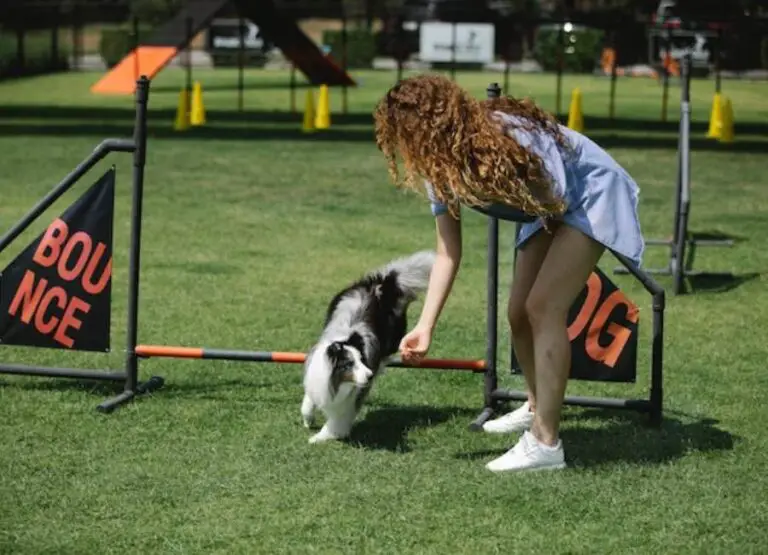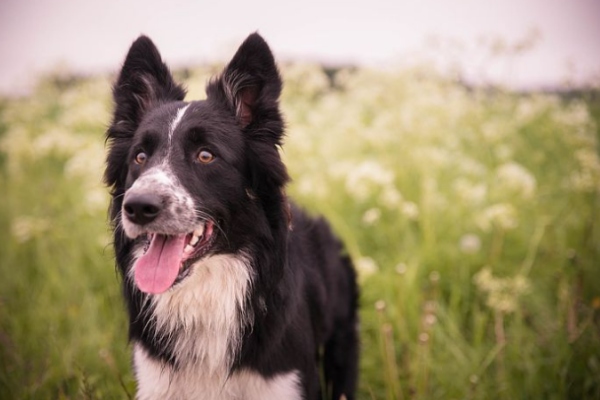10 Common Reasons For Corgi Aggression & Tips

Corgi aggression is a big issue for some owners who do not know how to fix corgi aggression or even know the common reasons for corgi aggression.
In this post, you will learn some of the common causes of corgi aggression towards other pets or humans.
You will also learn some signs of corgi aggression and finally how to prevent corgi aggression, so keep reading if that interests you!
Are corgis aggressive
Corgis are a non-aggressive dog breed recognized for being polite, having an outgoing personality, and being sociable canines that make great family pets.
However, being a herding dog corgis can become aggressive towards other pets or humans if not properly trained and socialized.
Let’s now look at some of the most common reasons why corgis may become aggressive towards other pets or humans.
Reasons for corgi aggression

Here are some of the most common reasons why corgis become aggressive:
1. Poor obedience training
The secret to breaking bad behaviors in corgis and other dogs is to give them early and correct obedience training.
Numerous incidents of canine aggression toward people, other animals, or other dogs can be attributed to poor obedience training.
You must give your corgi proper obedience training if you want to lessen or eradicate animosity against other dogs or people.
You can educate your corgi on how to follow instructions and when to let go of behavior through efficient obedience training.
All dogs—not just corgis—are in danger from poor socialization.
It can cause several behavioral issues in border collies, including excessive barking and a higher likelihood of aggressiveness toward other animals.
Your corgi may lack social skills if you wait until he is an adult or wait until he is a puppy and doesn’t socialize with him.
They can learn that no one is a threat if a variety of pets, people, and situations are introduced to them.
Simply said, corgis that are not properly socialized are more likely to engage in aggressive behaviors.
3. Fear
Most corgis turn hostile when they perceive a threat, are unable to escape and must defend themselves.
This can happen if a corgi is trapped and unable to escape, or if he thinks having a hand placed over his head would result in being struck.
To avoid inciting aggressive behavior, approach corgis with care, or even better, let them come to you.
Start socializing and teaching your corgi while he is a puppy to help him avoid future fear.
At any hour of the day or night, corgis will attack nearby people or animals if they feel threatened.
4. Chronic pain or illnesses
Chronic conditions like arthritis or joint discomfort might make corgis more aggressive at humans or other pets around.
In addition to brain tumors, seizures, neurological conditions, or thyroid difficulties, your corgi may become aggressive.
Even the most well-mannered dog or the most placid corgi may become violent as a result of such health issues.
If you believe this to be the cause of your corgi’s aggressive behavior, see a veterinarian right once.
It might be challenging to identify these issues on your own, so see a veterinarian provide your pet with the care they need.
5. Traumatic experience
Dogs frequently experience traumatic events, and traumatic events are one of the most frequent causes of aggressive behavior in corgis.
If you plan to adopt a corgi, inquire about the dog’s past as many rescue dogs suffer from anxiety or post-traumatic stress disorder as a result of earlier trauma.
Any corgi that has had trauma in the past but was not completely repaired is at risk of developing behavioral issues.
Keep in mind that corgis that have lived in unfriendly or harsh environments are more likely to experience emotional issues.
They experience fear and rage as a conditioned self-protective reaction, which causes unnecessarily aggressive behavior in corgis.
6. Too much frustration
One of the most frequent causes of aggression in dogs—not only in corgis but in all dogs—is frustration or sadness.
Corgis who are upset or sad may bite, bark, chew objects, or even attempt to leave the house.
There are several factors that contribute to a corgi’s high level of hostility when he is dissatisfied.
Too much time spent at home alone with your corgi, less care than usual, contempt for your corgi, etc.
Since corgis are herding dogs, they may become alarmed and uneasy by loud noises or sudden changes in routine.
All of this may cause excessive anger and dissatisfaction, which may then manifest as violent behavior.
Leaving your corgi alone at home can also lead to frustration.
7. Poor mental stimulation or exercises
Since corgis are an energetic and working breed of dog, you already know that they require a lot of brain stimulation exercises.
Corgis grow bored and are at a greater risk of being aggressive in the lack of appropriate mental stimulation activities or frequent exercise.
Corgis are active herding dogs that require daily activity to keep happy and healthy. They are not suitable for people who are sluggish.
Avoid getting a corgi if you are lethargic since boredom or loneliness increases the chances of aggressive behavior in corgis.
8. Hormonal changes
Your corgis will become hostile to other dogs, including their owners or other household pets, during mating season.
Your corgi is attempting to establish his authority in front of other dogs when he attempts to mount them.
Although neutering is a potential remedy, see your veterinarian first as it occasionally has unfavorable effects.
When a dog is in heat, they frequently create hormones that make them restless and more likely to become aggressive.
9. Separation anxiety
A corgi can have separation anxiety and behavioral issues when separated from its owner for an extended amount of time.
Corgis are a medium breed that may experience separation anxiety and start barking constantly minutes after their owners depart.
It’s not understood why certain dogs experience separation anxiety and others don’t, despite the fact that little dogs are more likely to yell.
This is one of the most frequent issues that corgi owners have, and it’s typically brought on by a lack of fundamental training.
When they are separated from their owners for too long, corgis exhibit hostile behavior and loud barking.
10. Lack of proper attention
Corgis require their owners’ constant undivided attention since they can become hostile if not given enough of it.
Good corgi care includes feeding your dog at the proper times, grooming him or her, bringing him or her for walks, and spending time cuddling or touching them.
When your corgi does something wrong, correct him gently and make sure he knows instead of shouting at him.
Make sure your corgi has access to clean, fresh water and high-quality food.
Reduce the likelihood of aggression by giving your corgi the care, exercise, and grooming he or she requires.
How to stop corgi aggression
Stopping corgi aggression is easier said than done but preventing it is much easier, we will combine both stopping and prevention.
The following are some tactics for preventing or dealing with corgi aggression:
1. Avoid harsh training
As a result of severe training techniques like prongs, shock collars, and other similar tools, many dogs become even more aggressive.
Never hit your corgi in the face if they disobey your severe training instructions.
Your young dog will only become more frightened or aggressive as a result of slapping, beating, or other severe punishments.
Avoid employing harsh or punishing methods during any training sessions; if your corgi isn’t executing it perfectly, remain calm and restart.
2. Never punish your corgi
Severe punishment could just hasten the onset of corgi aggression.
One of the brightest dog breeds, corgis just require a little bit of patience and training to meet your requirements.
Never penalize them for failing to adhere to your corrections; instead, begin the process again.
Give your corgi the opportunity to interact with both people and other dogs.
Introduce them to other canines or people in a safe and appropriate way.
If you’ve had pleasant experiences with your corgi and they haven’t disturbed you, don’t forget to express your gratitude.
Keep a watch on your corgi while they are among other people since they are prone to irritation or wrath at any time.
To prevent them from biting someone, get rid of them immediately if they’re aggressive.
If your corgi appears irate or aggressive around other dogs or people, don’t feed, pet, or carry them.
Proper socialization can help stop corgi aggression towards other pets or humans.
4. Regular mental stimulation & exercise
Because they are herding dogs, corgis require regular exercise to prevent boredom and corgi aggression.
Your corgi may develop bad habits and behaviors if you don’t provide him or her with adequate mental and physical stimulation.
Your corgi will love a daily routine of 10 to 30 minutes because of their sporty attitude.
Take your corgi on strolls and quick runs to encourage healthy development and expend excess energy.
There are furthermore accessible toys, video games, TV series, and other types of entertainment. These many pursuits will keep children content and healthy.
5. Stick to positive reinforcement
When you compliment your corgi on a job well done, you are reminding him that this is what you want from him.
These kinds of positive reinforcement methods encourage your dog to emulate his excellent behavior, which will eventually turn into a habit.
Conversely, using negative reinforcement techniques might harm your corgi.
Positive reward rather than negative reinforcement may usually be used to combat corgi aggressiveness.
6. Desensitize your corgi of his fears
If you could explain why corgis act aggressively, it would be amazing.
Avoid situations or actions that can make them hostile to make their lives as simple as you can for them.
Even while not all aggressive corgi triggers can be prevented, the great majority of them can be with a little more work.
It’s better to avoid bringing other animals into the house if your corgi is terrified of them.
Alternatively, teach your corgi that other dogs are OK by desensitizing him to their presence.
7. Provide your corgi’s basic needs
Corgis like receiving lots of love and attention, which may help explain why they are not aggressive.
Give your corgi a reward when they behave in a way you like, and associate aggression with bad behavior.
Give them cookies as a treat and compliment them. Ignore them for a while if they continue to act in a way that you find offensive.
To assist your corgi to identify the activities he likes and dislikes, you’ll need to be persistent and patient.
8. Avoid any kind of stress or frustration
Investigate the causes of your corgi’s anxiety and times of stress and avoid it.
You’ll be able to take the necessary steps to calm him down since it will be easier for you to identify the triggers and realize when he’s anxious.
Additionally, you should take all necessary precautions to keep your dog out of such delicate situations.
9. Stick to a daily routine that works
If you want to assist your corgi to become less aggressive, don’t encroach on his space or during mealtimes.
Create a plan for your corgi and follow it. When your Corgi isn’t sleeping, be sure to keep him entertained.
If you change the way your corgi eats, follow it until you and your corgi are both contents.
If you often switch your corgi’s diet, stay with what works for you at the moment.
10. Seek professional help
Training alone frequently isn’t enough to stop aggressiveness in corgis or other smaller breeds.
If your corgi is aggressive, medication can be needed to help them manage its behavior.
It’s crucial to realize that a dog cannot learn new things if it is fearful, nervous, or worried.
To assist your dog to conquer his or her fear, think about giving him or her medicine.
Most dogs only require medicine for a short period of time.
Speak with your veterinarian or an animal behaviorist for further details and to better understand your corgi aggression.
Corgi suddenly aggressive
Corgi’s sudden aggression can be caused by a number of factors which include illness, stress, trauma, anxiety, fear, and change of routine or environment.
Even with proper socialization and training, your corgi can suddenly become aggressive and would require the patient to fix him.
If you are not sure why your corgi suddenly became aggressive you should see your vet and be sure it’s not for medical reasons.
Signs of corgi aggression
Some of the most prevalent signs of hostility in corgis are the ones listed below:
- A deep and penetrating hard stare.
- Constant high-pitched or low-pitched barking.
- Never-ending snapping and growling at things.
- Your corgi always stands tall when provoked or in the presence of other pets.
- Your corgi keeps his ears up when provoked or approach by other pets.
- Progressively lunging actions in the presence of other pets or humans.
- Your corgi moves its body stiffly from side to side in response to any provocation.
- When strangers or other dogs get close, the corgi barks furiously.
- Sudden unnecessary showing of teeth.
Forms of corgi aggression
The following list includes some of the most typical forms of corgi aggression:
- Fear aggression.
- Anxiety form of aggression.
- Redirected form of aggression.
- The social form of aggression.
- Resource guarding form of aggression.
- Territorial form of aggression.
- Pain-Related form of aggression.
Finally,
If you have tried some of the methods listed in this post you should see an animal behaviorist or your vet.
I hope with the information provided on this page your concerns about corgi aggression were resolved!



![Do Boston Terriers Bark A Lot [Explained] Do Boston Terriers Bark A Lot](https://petcreeks.com/wp-content/uploads/2022/11/Do-Boston-Terriers-Bark-A-Lot-768x555.jpg)
![Dog Keeps Running Away [Helpful Tips] Dog Keeps Running Away](https://petcreeks.com/wp-content/uploads/2023/02/Dog-Keeps-Running-Away-768x555.jpg)

